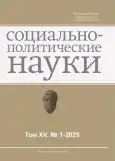Similarities and differences in the soft power policies of China and Russia in the field of education
- Autores: Yukun Z.1, Kerimov A.A.1
-
Afiliações:
- Ural Federal University named after the first President of Russia B.N. Yeltsin
- Edição: Volume 15, Nº 1 (2025)
- Páginas: 43-50
- Seção: Political Institutions, Processes and Technologies
- URL: https://journal-vniispk.ru/2223-0092/article/view/313353
- DOI: https://doi.org/10.33693/2223-0092-2025-15-1-43-50
- EDN: https://elibrary.ru/IMPDWA
- ID: 313353
Citar
Resumo
This article analyzes and compares the strategies and tactics of “soft power” employed by China and Russia in the field of education. The research is based on the study of official documents, scientific literature, and statistical reports. An analysis of data on the number of students participating in educational programs in Russia and China and their potential influence on public opinion and perception of the countries is provided. As a result of the research, common features of “soft power” in the educational sphere of China and Russia were identified, defining the mechanism of broadcasting the national interests of countries, alternative to the West, through the opening of educational institutions in other countries. Common tools of authorities as the main agent of “soft power” (state programs, scientific and student projects, grants, and funding) are described. Distinctive features highlight differences in cultural foundations and historical prerequisites for influence, as well as changes in the role of China and Russia in the global system of international relations at the present stage.
Palavras-chave
Texto integral
##article.viewOnOriginalSite##Sobre autores
Zhang Yukun
Ural Federal University named after the first President of Russia B.N. Yeltsin
Autor responsável pela correspondência
Email: xy954504210@gmail.com
ORCID ID: 0009-0008-5346-6337
Código SPIN: 4985-7802
postgraduate student, Department of Political Sciences
Rússia, YekaterinburgAlexander Kerimov
Ural Federal University named after the first President of Russia B.N. Yeltsin
Email: kerimov68@mail.ru
ORCID ID: 0000-0002-5807-9810
Scopus Author ID: 57215904379Ю
Researcher ID: AAG-9905-2019
Dr. Sci. (Polit.), Associate Professor, Professor, Department of Political Sciences
Rússia, YekaterinburgBibliografia
- Budaev A.V. Comparative analysis of “soft power” in Russia’s and China’s foreign policy. Politics and Society. 2016. No. 7. Рp. 948–959. (In Rus.). doi: 10.7256/1812-8696.2016.7.15644.
- Neimark M.A. Geopolitics of “soft power”: Russia’s experience. Moscow: Dashkov i K. 2021. 250 p.
- Nikolaev V.K. Export of education in Russian universities in the new reality. Higher Education in Russia. 2022. Vol. 31. No. 2. Рp. 149–166. (In Rus.). doi: 10.31992/0869-3617-2022-31-2-149-166.
- Rostovskaya T.K., Vasilieva E.N. Education as a resource for forming “soft power” in working with young compatriots living in the CIS countries. Higher Education in Russia. 2023. Vol. 32. No. 5. Рp. 21–35. (In Rus.). doi: 10.31992/0869-3617-2023-32-5-21-35.
- Skriba A. “Soft power” and the post-Soviet space at present: Conclusions for Russia. Politics and Society. 2016. No. 10. Рp. 1400–1412. (In Rus.). doi: 10.7256/1812-8696.2016.10.16496.
- Atkinson C. Does soft power matter? A comparative analysis of student exchange programs 1980–2006. Foreign Policy Analysis. 2010. No. 6 (1). Рp. 1–22.
- Brazys S., Dukalskis А. Rising powers and grassroots image management: Confucius institutes and China in the media. The Chinese Journal of International Politics. 2019. No. 12 (4). Рp. 557–584.
- Ding S., Saunders R. Talking up China: An analysis of China’s rising cultural power and global promotion of the Chinese language. East Asia. 2006. No. 23. Рp. 3–33.
- Gallarotti G. Soft power: What it is, why it’s important, and the conditions for its effective use. Journal of Political Power. 2011. No. 4 (1). Рp. 25–47.
- Hartig Fa. Communicating China to the world. Politics. 2015. No. 35. Рp. 245–258. doi: 10.1111/1467-9256.12093.
- Hill F. Moscow discovers soft power. Current History. 2006. Vol. 105. No. 693. Рp. 341–347.
- Huang Y., Sheng D. Dragon’s underbelly: An analysis of china’s soft power. East Asia. 2006. No. 23. Рp. 22–44.
- Lebedeva M.M. Russian public diplomacy. From USSR to the Russian Federation. London: Routledge, 2021. 78 p.
- Lo T., Sayan P. The internationalisation of China’s higher education: Soft power with “Chinese Characteristics”. Comparative Education. 2021. No. 57 (2). Рp. 227–246. doi: 10.1080/03050068.2020.1812235.
- Lowe D. Australia’s Colombo plans, old and new: International students as foreign relations. International Journal of Cultural Policy. 2015. No. 21 (4). Рp. 448–462.
- Mingjiang Li. China debates soft power. The Chinese Journal of International Politics. 2008. No. 2 (2). Рp. 287–308.
- Nye J. Soft power: The means to success in world politics. New York: Public Affairs Books, 2005. 216 р.
- Pestereva N., Kholina V., Qi W. The Russian market for exported educational services: The Shanghai Cooperation Organization (SCO) Network University. European Journal of Contemporary Education. 2019. Vol. 8. No. 3. Рp. 574–586.
- Sergunin A., Karabeshkin L. Understanding Russia’s soft power strategy. Politics. 2015. Vol. 35. No. 3-4. Рp. 347–363. doi: 10.1111/1467-9256.12109.
- Velikaya A., Simons G. Russia`s public diplomacy. Evolution and practice. London: Palgrave Macmillan, 2020. 285 p.
- Wilson J. Soft Power: A comparison of discourse and practice in Russia and China. Europe-Asia Studies. 2015. No. 67 (8). Рp. 1171–1202. doi: 10.1080/09668136.2015.1078108.
- Lan Jun. Historical study on cross-border cooperation in higher education between China and foreign countries in modern times. Higher Education Management. 2010. No. 3. Рp. 87–92.
- Liu Changming, Wei Licheng. Analysis of educational exchanges between Chinese and American international students since 2010. Higher Education in China. 2015. No. 5. Рp. 38–41.
Arquivos suplementares








